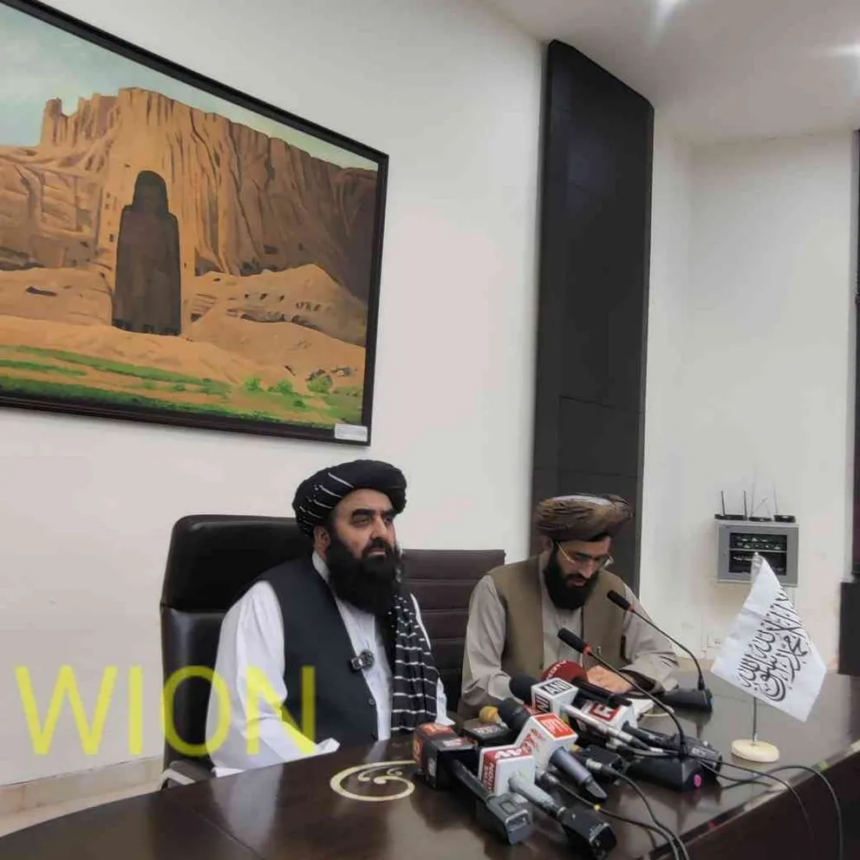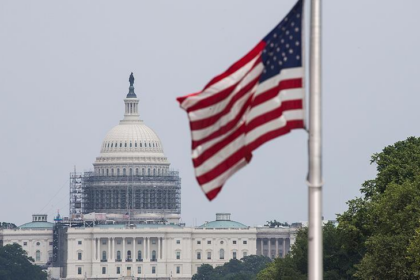RASC News Agency: Amir Khan Muttaqi’s recent trip to New Delhi, branded by the Taliban as a “diplomatic outreach,” quickly unraveled into a spectacle of controversy, humiliation, and global ridicule. Intended to project legitimacy and political relevance, the visit instead exposed the regime’s diplomatic immaturity, its deep-seated misogyny, and its inability to separate governance from fanaticism.
During his meeting with Indian Foreign Minister Subrahmanyam Jaishankar, observers immediately noted the absence of both national flags an unprecedented diplomatic omission. According to The Indian Express, Indian authorities deliberately avoided displaying either the flag of India or Afghanistan to sidestep the contentious question of whether Afghanistan should be represented as the “Republic of Afghanistan” or under the Taliban’s unrecognized banner of the “Islamic Emirate.” The empty backdrop, devoid of any emblem, became a silent but powerful statement of India’s refusal to grant symbolic legitimacy to the Taliban’s rule.
Outside the Afghanistani Embassy in New Delhi, tensions escalated even before the Taliban delegation’s arrival. A former embassy employee defiantly hoisted the tricolor flag of the previous republic, preventing the Taliban’s white banner from being raised. “Until India formally recognizes them, that flag will never fly here,” he declared. His act of resistance drew applause from dozens of Afghanistani refugees, who chanted in support and blocked Taliban representatives from altering the embassy’s symbols. The Indian Express aptly described the standoff as “a final act of symbolic defiance against tyranny, unfolding on Indian soil.”
This confrontation reflected a deeper truth — that despite their two years in power, the Taliban have failed to command moral authority either inside Afghanistan or abroad. Even among exiled diplomats, many of whom once served the Afghanistani Republic, the Taliban’s legitimacy remains unrecognized and resented.
The controversy did not end there. During Muttaqi’s press briefing at the embassy, several female journalists from India’s major media outlets, including India Today and Times Now, were barred from entering the room despite holding official invitations and adhering to dress requirements. According to one reporter interviewed by NDTV, “We were told flatly that women are not allowed there was an order.”
The exclusion provoked an uproar among Indian journalists and rights advocates. Suhasini Haidar, Foreign Affairs Editor of The Hindu, condemned the incident on X (formerly Twitter): “By hosting the Taliban officially, the Indian government has imported their misogyny onto Indian soil. This is not diplomacy it is capitulation.”
When pressed about the Taliban’s brutal restrictions on women’s rights in Afghanistan, Muttaqi responded with his usual evasive rhetoric, calling such concerns “propaganda” and adding: “We have Sharia law, and everyone has rights. Every country has its traditions.” His remarks, cloaked in religious justification, only deepened the perception that the Taliban remain incapable of reform treating oppression as a cultural virtue rather than a human rights crime.
In another revealing act of image manipulation, photographs released by Taliban media deliberately cropped out the background image of the Bamiyan Buddhas the ancient monuments the group destroyed in 2001 in one of history’s most infamous acts of cultural annihilation. This attempt to rewrite history mirrored the Taliban’s broader effort to sanitize their image internationally while continuing domestic repression with impunity.
According to reports, as the Taliban delegation exited the embassy, they refused to walk past the Afghanistani tricolor still flying at the main entrance, instead slipping out through a side gate. When asked whether the embassy belonged to the Taliban or the Republic of Afghanistan, one delegate curtly replied: “It belongs to us.” His defensive tone captured the regime’s broader insecurity a fragile authority propped up by fear and isolation rather than by popular mandate.
Analysts in New Delhi and beyond argue that the episode reveals the Taliban’s diplomatic incompetence and ideological rigidity. “They claim to represent Afghanistan,” said one Indian security expert, “but their every gesture from excluding women to denying the nation’s flag shows they represent only their own tyranny.”
Muttaqi’s India trip, which the Taliban had hoped would showcase their global relevance, has instead underscored their political illegitimacy and moral decay. Rather than opening doors, the visit reminded the world that the Taliban remain a pariah regime one that cannot coexist with the principles of modern statecraft, human dignity, or international law.
In the end, what unfolded in New Delhi was not a diplomatic success but a theatrical display of a regime still trapped in its medieval mindset a reminder that no amount of travel or ceremony can disguise the Taliban’s fundamental hostility to freedom, women’s rights, and the very identity of Afghanistan itself.






